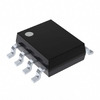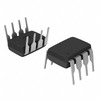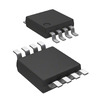Manufacturer Part Number
MAX9140AAXK/V+T
Manufacturer
Analog Devices
Introduction
The MAX9140AAXK/V+T is a general-purpose linear comparator designed for automotive applications, crafted to deliver reliable performance in various voltage conditions.
Product Features and Performance
Single element general-purpose comparator
Output types include CMOS, Push-Pull, and TTL
Supports voltage supply range from 2.7V to 5.5V
High Common-Mode Rejection Ratio (CMRR) and Power Supply Rejection Ratio (PSRR) values at 61.41dB and 61.94dB respectively
Low propagation delay of 40ns
Built with hysteresis of 1.5mV
Operates over a wide temperature range from -40°C to 125°C
Product Advantages
Optimized for automotive grade applications with a qualification of AEC-Q100
Very low input offset voltage and input bias current for increased accuracy
Low power consumption with a maximum quiescent current of 400µA
Compact 5-TSSOP, SC-70-5, SOT-353 package suitable for surface mounting
Key Technical Parameters
Supply Voltage: 2.7V ~ 5.5V
Input Offset Voltage (Max): 6mV @ 5V
Input Bias Current (Max): 0.35µA @ 5V
Quiescent Current (Max): 400µA
Propagation Delay (Max): 40ns
Operating Temperature Range: -40°C ~ 125°C
Accuracy enhancement features: 61.41dB CMRR, 61.94dB PSRR
Quality and Safety Features
Automotive grade component with AEC-Q100 qualification
Enhanced durability and reliability under extreme temperature conditions
Compatibility
Compatible with various logic families due to CMOS, TTL, and Push-Pull output type support
Application Areas
Automotive electronics
Control system circuits
Timing circuits
Voltage monitoring systems
Product Lifecycle
The product status is marked as Obsolete indicating discontinuation in production
Check for replacements or upgrade options from Analog Devices for newer or alternative solutions
Several Key Reasons to Choose This Product
Provides precise performance with maximum input offset voltage of 6mV and input bias current of 0.35µA
Suitable for high-temperature applications up to 125°C, ensuring robust performance in automotive environments
The ultra-low propagation delay of 40ns makes it ideal for timing critical applications
Low power requirements enhance system efficiency
Rigid compliance with automotive standards as evidenced by AEC-Q100 qualification



 MAX9140EXKMAIXM
MAX9140EXKMAIXM MAX913EPA+Maxim
MAX913EPA+Maxim MAX913EPAAnalog Devices Inc./Maxim IntegratedIC COMPARATOR 1 W/LATCH 8DIP
MAX913EPAAnalog Devices Inc./Maxim IntegratedIC COMPARATOR 1 W/LATCH 8DIP MAX9140EUK-TAnalog Devices Inc./Maxim IntegratedIC COMPARATOR 1 GEN PUR SOT23-5
MAX9140EUK-TAnalog Devices Inc./Maxim IntegratedIC COMPARATOR 1 GEN PUR SOT23-5 MAX9141EKA+TAnalog Devices Inc./Maxim IntegratedIC COMPARATOR 1 W/LATCH SOT23-8
MAX9141EKA+TAnalog Devices Inc./Maxim IntegratedIC COMPARATOR 1 W/LATCH SOT23-8 MAX913MJAAnalog Devices Inc./Maxim IntegratedIC COMPARATOR 1 W/LATCH 8CERDIP
MAX913MJAAnalog Devices Inc./Maxim IntegratedIC COMPARATOR 1 W/LATCH 8CERDIP MAX913EUA+TAnalog Devices Inc./Maxim IntegratedIC COMPARATOR 1 W/LATCH 8UMAX
MAX913EUA+TAnalog Devices Inc./Maxim IntegratedIC COMPARATOR 1 W/LATCH 8UMAX